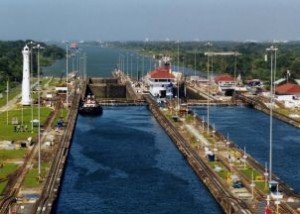
(The Guardian) Nicaragua has awarded a Chinese company a 100-year concession to build an alternative to the Panama Canal, in a step that looks set to have profound geopolitical ramifications.
The president of the country’s national assembly, Rene Nuñez, announced the $40bn (£26bn) project, which will reinforce Beijing’s growing influence on global trade and weaken US dominance over the key shipping route between the Pacific and Atlantic oceans.
The name of the company and other details have yet to be released, but the opposition congressman Luis Callejas said the government planned to grant a 100-year lease to the Chinese operator.
The national assembly will debate two bills on the project, including an outline for an environmental impact assessment, on Friday.
Nicaragua’s president, Daniel Ortega, said recently that the new channel would be built in the north of the country, through the waters of Lake Nicaragua.
The new route will be a higher-capacity alternative to the 99-year-old Panama Canal, which is currently being widened at the cost of $5.2bn.
Last year, the Nicaraguan government noted that the new canal should be able to allow passage for mega-container ships with a dead weight of up to 250,000 tonnes. This is more than double the size of the vessels that will be able to pass through the Panama Canal after its expansion, it said.
According to a bill submitted to congress last year, Nicaragua’s canal will be 22 metres deep, 20 metres wide and 286 km (178 miles) long – bigger than Panama and Suez in all dimensions.
Under the initial plans for the project, the government was expected to be the majority shareholder, with construction taking 10 years and the first ship passing through the canal within six years. It is unclear if this is still the case.
Two former Colombian officials recently accused China of influencing the international court of justice to secure the territorial waters that Nicaragua needs for the project.
In an op-ed piece for the magazine Semana, Noemí Sanín, a former Colombian foreign secretary, and Miguel Ceballos, a former vice-minister of justice, said a Chinese judge had settled in Nicaragua’s favour on a 13-year-old dispute over 75,000 square kilometres of sea.
They said this took place soon after Nicaraguan officials signed a memorandum of understanding last September with Wang Jing, the chairman of Xinwei Telecom and president of the newly established Hong Kong firm HK Nicaragua Canal Development Investment Company, to build and operate the canal.
Nicaragua has accused Colombia and Costa Rica, which also has a claim on territory likely to be used by the new canal, of trying to prevent the project going ahead.